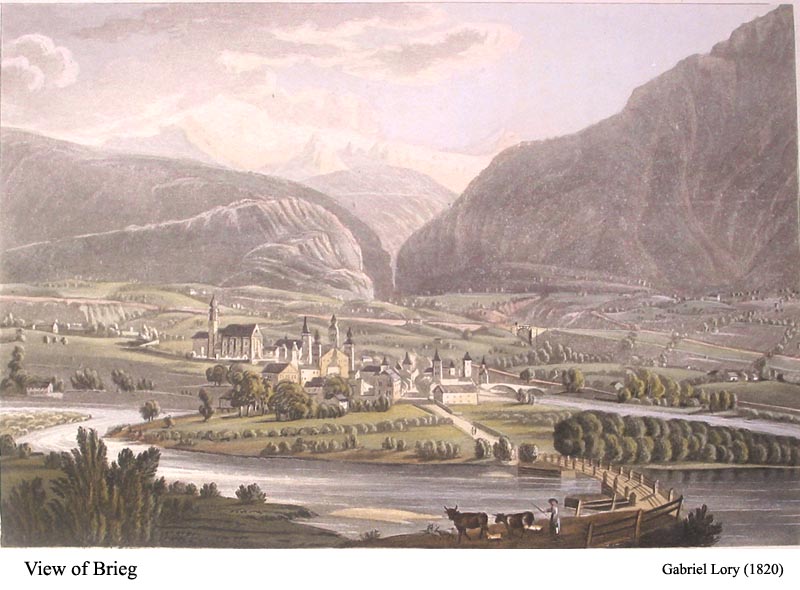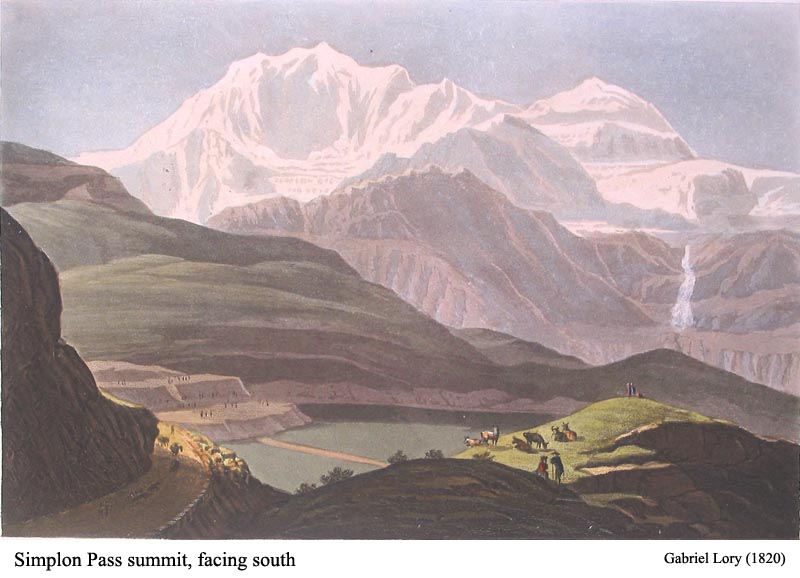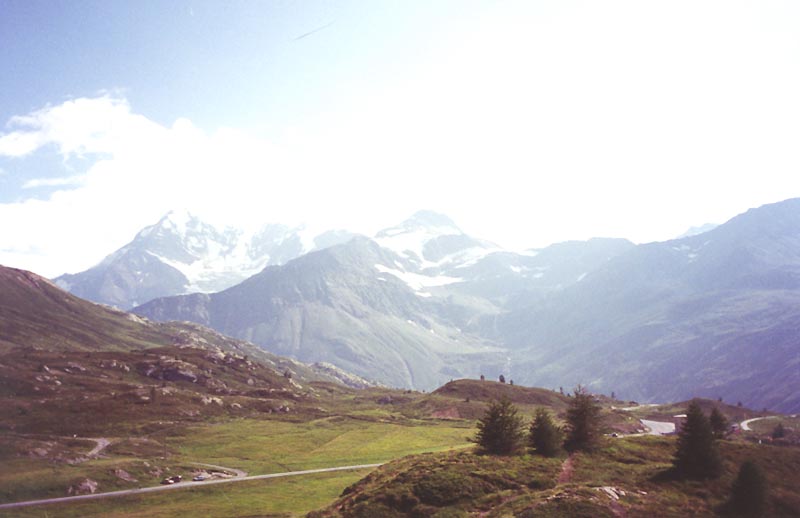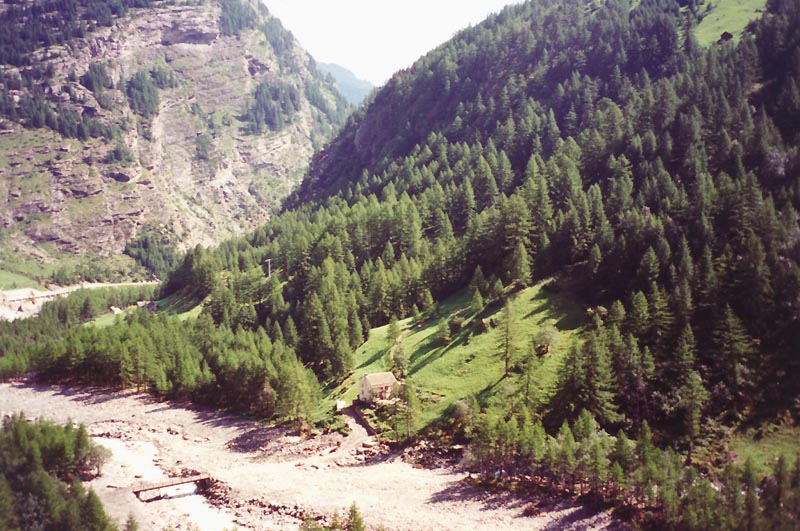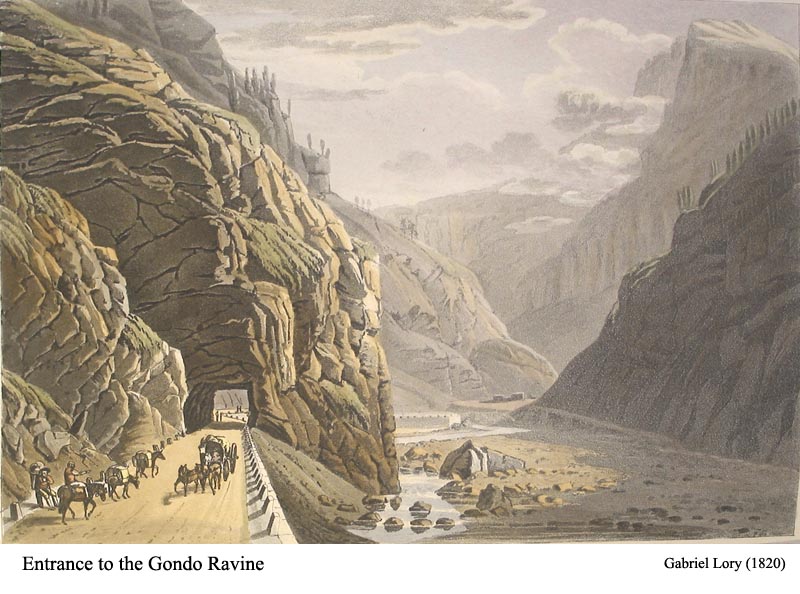Wordsworth at the Simplon Pass
(based on the account I provide on Romanticism: The CD -- David S. Miall)
Prints by Lory are from: Frederic Schoberl, Picturesque Tour from Geneva to Milan, by Way of the Simplon. London: R. Ackermann,1820. Photos are by David S. Miall.
Citations from The Prelude are from the 13-book version of 1805, ed. Wordsworth, Abrams, Gill, NY: Norton.
1. The Route
2. The Poem
3. Other notes on Book VI
1. The Route
After Wordsworth and Jones visited Chamonix they returned to Martigny and walked up the Valais as far as Brig. Here they turned off on the path leading south over the Simplon Pass. In 1790 the path would have been a more modest one than that shown in this print of 1820 (view of Brig facing south):
In Wordworth's letter, in which he reports his progress to Dorothy, he writes:
At Brig we quitted the Valais, and passed the Alps at Simplon, in order to visit part of Italy. The impressions of three hours of our walk among the Alps will never be effaced.
The account in Book VI of The Prelude describes the events of this day (August 17) in considerable detail. Wordsworth and Jones crossed the summit of the Simplon Pass without realizing it. It seems likely that the day was cloudy, but even if Wordsworth had been able to see clearly, the range of mountains to the south must have misled him, as this print and my photograph show, leading him to believe that the summit of the Alps was yet to come:
The works shown on the left in the print are the foundations for the new Hospice, initiated by Napoleon (whose new road over the Simplon is also shown).
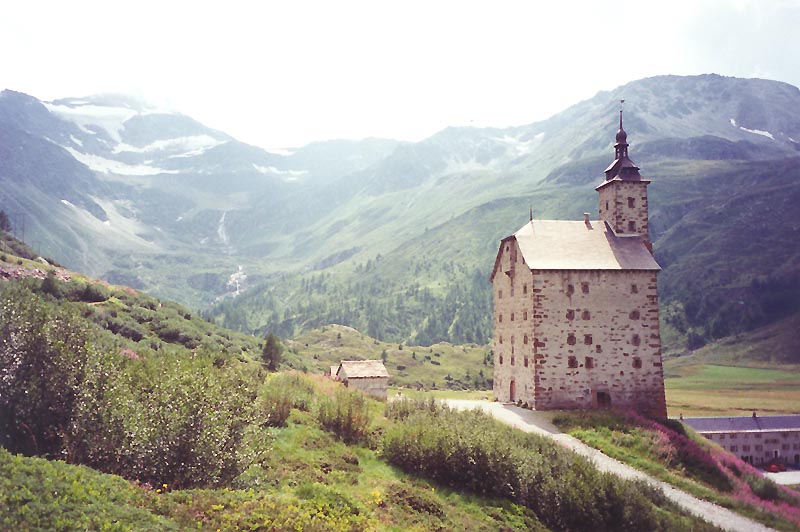 Wordsworth
and Jones had lunch at the Old Spittal or Hospice (shown on the right) a couple
of miles beyond the actual summit with a company of other travellers (free
meals were provided to travellers here). Then they set off on their own down
the pathway. At the bottom of the valley, where they crossed the Laggina river,
they climbed a path up a steep hill opposite, believing this to be their route:
"The only track now visible was one / Upon the further side, right opposite,
/ And up a lofty mountain" (ll. 504-6). As a photograph shows, it is not evident
that the correct path lies to the west, in the narrow opening of the Gondo
Ravine (the modern roadway now marks this route clearly).
Wordsworth
and Jones had lunch at the Old Spittal or Hospice (shown on the right) a couple
of miles beyond the actual summit with a company of other travellers (free
meals were provided to travellers here). Then they set off on their own down
the pathway. At the bottom of the valley, where they crossed the Laggina river,
they climbed a path up a steep hill opposite, believing this to be their route:
"The only track now visible was one / Upon the further side, right opposite,
/ And up a lofty mountain" (ll. 504-6). As a photograph shows, it is not evident
that the correct path lies to the west, in the narrow opening of the Gondo
Ravine (the modern roadway now marks this route clearly).
| The Laggina, showing the path up the Feerberg taken in error. The entrance to the ravine appears on the left beyond. | The entrance to the ravine in 1820 (new road). The old path is still visible on the right bank of the valley. |
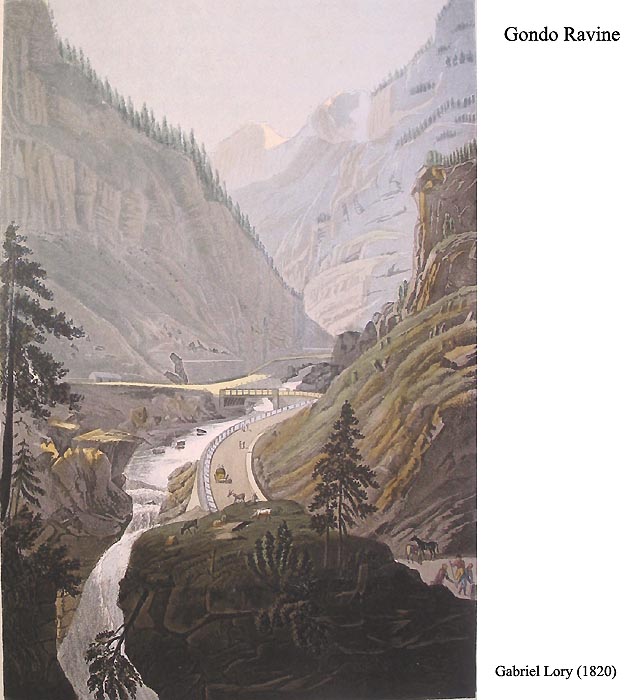 After
learning of their mistake -- "we had crossed the Alps" (l. 524) -- Wordsworth
and Jones would have returned to the edge of the Laggina, and walked into the
Ravine on the right bank of the river. In The Prelude this mistake is
made the occasion of an important passage on the imagination (525-548). The
road through the Ravine was shortly to be built by Napoleon on the other side
of the Ravine, and the old path was no longer maintained. (None of the contemporary
views I have been able to locate shows the route as it was before the building
of this road.) Wordsworth's "three hours walk" was undoubtedly that in the Gondo
Ravine, given the evocative description he was later to provide in The Prelude.
After
learning of their mistake -- "we had crossed the Alps" (l. 524) -- Wordsworth
and Jones would have returned to the edge of the Laggina, and walked into the
Ravine on the right bank of the river. In The Prelude this mistake is
made the occasion of an important passage on the imagination (525-548). The
road through the Ravine was shortly to be built by Napoleon on the other side
of the Ravine, and the old path was no longer maintained. (None of the contemporary
views I have been able to locate shows the route as it was before the building
of this road.) Wordsworth's "three hours walk" was undoubtedly that in the Gondo
Ravine, given the evocative description he was later to provide in The Prelude.
That night Wordsworth and Jones slept in the Spittal at Gondo village, "A dreary mansion, large beyond all need" (577). The next day they continued into Italy via the Val Divedro to Lago Maggiore.
2. The Poem
Crossing the Alps, Book VI of The Prelude 1805
Notes (by line numbers); for sources of quotations not otherwise identified
see Miall (1998)
| Chamonix | ||
| 460 | "Five rivers" | the five glaciers that descend into the Chamonix valley |
| 467 | "make sport" | the glaciers intruded on meadows and fields of corn |
| 482 | "Dejection taken up" | cf. the pose of the melancholy traveller in the opening of Descriptive Sketches; a picturesque pose |
| The Simplon Pass | ||
| 492 | "A deep and genuine sadness" | disappointment appears several times in the account of this tour, as well as in Wordsworth's letter to Dorothy |
| 495 | "travellers" | probably a mule train taking goods to Italy |
| 513 | "a peasant" | in an earlier draft Wordsworth says "A heavy mist/shower / Began to fall with vapours streaming round"; forced to take shelter in a hut, "a Peasant chanced to pass" from whom they learned their mistake |
| 524 | "we had crossed the Alps" | i.e., had the experience but missed its significance; cf. the template for the picturesque that turns out to be a mismatch, 482 above |
| The Gondo Ravine | ||
| 525 | "Imagination" | during the present process of writing: in an earlier draft Wordsworth said "my verse / Halts in mid course." He had earlier included here the first draft of the passage on the Cave of Yordas to explicate his response (relocated to viii, 711-740; in Wu, 393-4), with its three phases of projection, reality, imagination |
| 527 | "unfathered vapour" | unlike his earlier picturesque approach, fathered by Gilpin |
| 534 | "light of sense" | possibly a retrospective reference to the picturesque, with its dependence on the visual: his "degradation," as he put it Book XI, "when through the gorgeous Alps" he roamed (xi, 240-2) |
| 545 | "blessed in thoughts" | cf. "Tintern Abbey": " We see into the life of things" (line 50) |
| 568 | "like workings of one mind" | in his fragment on the sublime and beautiful (1811-12) Wordsworth says that while the mind cannot attain the sublime energies yet "it participates force which is acting upon it" (Prose ii.354) |
3. Other notes on Book VI
Trient, between the Valais and the Vale of Chamonix:
A green recess, an aboriginal vale
Quiet, and lorded over and possessed
By naked huts, wood-built, and sown like tents
Or Indian cabins over the fresh lawns
And by the riverside. (vi, 448-52)
Night at Gondo, in Spittal:
A dreary mansion, large beyond all need,
With high and spacious rooms, deafened and stunned
By noise of waters, making innocent sleep
Lie melancholy among weary bones. (577-580)
Como. Refers to Descriptive Sketches:
I spake
Of thee, thy chestnut woods, and garden plots
Of Indian corn tended by dark-eyed maids,
Thy lofty steeps, and pathways roofed with vines (591-5)
Realism:
On the rock we lay
And wished to sleep but could not for the stings
Of insects which with noise like that of noon
Filled all the woods. (641-4)
Picturesque (again):
[Not] a mean pensioner
On outward forms (667-8)
Unconcern with revolution or signs of war in 1790:
I seemed to move among them as a bird
Moves through the air (697-8)
Document prepared February 24th 2003 / Updated August 31st 2011
